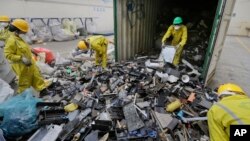Electrical and electronic waste is piling up worldwide, according to warnings from a new report released Wednesday by the U.N. International Telecommunication Union and the U.N. Institute for Training and Research.
E-waste is defined as any discarded device with a plug or battery, such as phones, laptops or electric cars.
According to the new report, nearly 62 million tons of e-waste was generated in 2022, with no signs of a reversal of the trend or increased rates of recycling. This waste can contain hazardous materials like mercury or rare Earth metals.
The waste is also not always stored effectively. Just over 22% of the e-waste mass was properly collected and recycled in 2022, according to the U.N.
Higher rates of e-waste can be attributed to higher consumption, limited repair options, shorter product life cycles, growing "electronification" of society, and inadequate e-waste management infrastructure, the U.N. agencies said.
"The latest research shows that the global challenge posed by e-waste is only going to grow," said Cosmas Zavazava, department chief at the International Telecommunication Union. "With less than half of the world implementing and enforcing approaches to manage the problem, this raises the alarm for sound regulations to boost collection and recycling."
The increase in e-waste has also led to an increase in scavengers in the developing world who pick through trash at landfills for e-waste to resell potentially valuable materials. This comes with increased health risks, particularly for those who rely on scavenging to earn a living.
"When the e-waste comes here, it contains some powder which affects my health," said Steve Okoth, who makes a small income from scavenging. He said that when electronic devices heat up, they release gases, and he "can't come to work because of chest problems."
Some information for this report was provided by The Associated Press.
